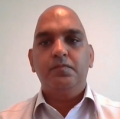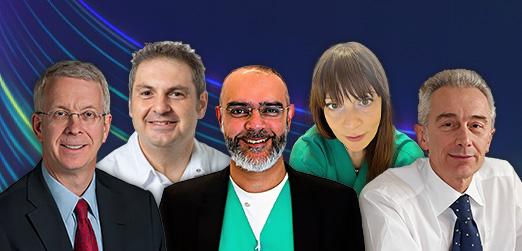- Home
- Convergent Procedure: A New Approach to Atrial Fibrillation Ablation
Convergent Procedure: A New Approach to Atrial Fibrillation Ablation
- Heart Rhythm
- Intervention
Available Credit:
- 1.00
Course Published On:
Course Expiry Date:

Overview
The cornerstone of atrial fibrillation (Afib) is electrical isolation of the pulmonary veins (PV). In patients with non-paroxysmal Afib, PV isolation alone is insufficient and one needs to modify the atrial arrhythmogenic substrate. Afib ablation is now a fairly common procedure and mostly performed using a transvenous, endocardial approach with catheters. For patients with persistent Afib however, this procedure is not sufficient.
There is a growing movement towards a convergent procedure management strategy, used alongside standard catheterisation techniques to optimise patient outcomes. More and more research suggests that an integrated approach involving multidisciplinary teams (of electrophysiologists and surgeons) may lead to improved success rates and increased patient satisfaction.
Convergent procedure is a promising therapy for patients’ refractory to standard Afib-treatment, however the approach involves some challenges that require specific attention from the medical specialities involved. It is a new way of working for both EPs and surgeons so the benefits and best ways of implementing this in clinical practice are still largely unknown.
Join a panel of international faculty as they discuss the clinical value of the convergent procedure as a treatment strategy for persistent atrial fibrillation ablation.
- How can it improve patient outcomes?
- What evidence base is available to support its use?
- How can it be implemented effectively in clinical practice?
Support Statement
This activity has been supported by an unrestricted educational grant from AtriCure Inc.
Disclosure
This programme is accredited by the European Board for Accreditation in Cardiology (EBAC) for 1 hour of external CME credit(s). Each participant should claim only those hours of credit that have actually been spent in the educational activity. EBAC works according to the quality standards of the European Accreditation Council for Continuing Medical Education (EACCME), which is an institution of the European Union of Medical Specialists (UEMS). In compliance with EBAC/ EACCME guidelines, all speakers/chairpersons participating in this programme have disclosed or indicated potential conflicts of interest which might cause a bias in the presentations. The Organizing Committee/Course Director is responsible for ensuring that all potential conflicts of interest relevant to the event are declared to the audience prior to the CME activities.
Radcliffe-CME requires contributors to our CME programmes to disclose any relevant financial relationships that have occurred within the past 12 months that could create a conflict of interest. These will be identified in the faculty section if applicable.
Please note that relevant faculty disclosures are included in the presentations.
Terms & Conditions
Information contained in our CME programmes is intended for use by registered healthcare professionals. The material presented here does not necessarily represent the views of Radcliffe-CME or companies that support educational programmes for Radcliffe-CME. The information presented may discuss unpublished uses of agents or products that have not been approved by the Europeans Medicines Agency for use in Europe and/or off-label products.
The information should not be considered medical advice on which you should rely and as licensed healthcare professional, you must always use your professional judgement before using our content and should independently verify any information that you choose to rely on. If you are not a licensed healthcare professional you should always seek advice from a healthcare professional prior to acting on the basis of any content on this Website.
Instructions to Participants
There is no fee for taking part in this online learning activity.
Activities are designed to be completed within 60 minutes and must be completed by the registered user. Physicians should only claim credits for time spent on the activity. To successfully earn credit, participants must complete the activity in full in the indicated time frame.
To complete the course and claim certification participants must:
1. Read the course outline information supplied and complete pre-test questions if supplied prior to starting the activity. Users must read and study the activity in its entirety before completing the post-test questions.
2. Your results will be automatically saved and if a pass score is achieved (where applicable), you may be eligible to claim credit for the activity and receive a certificate of completion.
Target Audience
This programme is intended to educate:
- Electrophysiologists
- General Cardiologists
Learning Objectives
- After this session electrophysiologists will be able to identify the causes of sub-optimal outcomes in atrial ablation, describe the convergent procedure and appropriate patients, and outline the electrophysiologist’s role.
Module |
Title |
Duration |
Speakers |
|---|---|---|---|
| 1 | The ongoing challenges of atrial fibrillation | Jaswinder Gill (London, UK) | |
| 2 | The electrophysiologic problem leading to sub-optimal outcomes | Claudio Tondo (Milan, Italy) | |
| 3 | Convergent ablation: The what and the why | Felix Yang (New York, USA) | |
| 4 | The role of the electrophysiologist in convergent ablation: The how and the who | Syed Ahsan (London, UK) |
The electrophysiologic problem leading to sub-optimal outcomes
Duration:
Speakers: Claudio Tondo (Milan, Italy)
The role of the electrophysiologist in convergent ablation: The how and the who
Duration:
Speakers: Syed Ahsan (London, UK)
Course Director
Speaker






